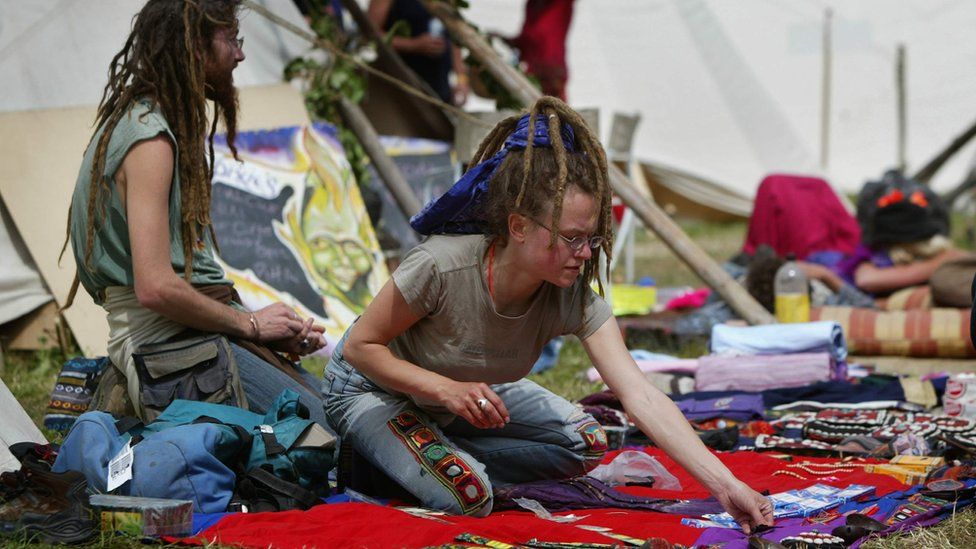Extinction Rebellion: What exactly is a crusty?
- Published

If you were born after 1995, Boris Johnson's reference to "uncooperative crusties" may have left you baffled.
The prime minister used the term to refer to climate change activists currently protesting across the UK.
But it's left a generation asking "what on earth is Boris Johnson talking about?"
So here, for those born in the days since The Levellers last troubled the charts, is a quick guide to that most nineties of subcultures.
Crusty or Crustie?
It turns out you can spell it either way depending on your personal preference. We've opted for crusty over crustie but it's really up to you.
The term became popular in the nineties to refer to a particular group of people who dressed and behaved in a certain way.
So popular in fact the Oxford English Dictionary included it in its 1997 edition.
The full definition was: "A group of homeless or vagrant young people, generally living by begging in cities, and characterized by rough clothes, matted, often dreadlocked hair, and an unkempt appearance. Also the name given to the sub-culture as a whole."
Yes, there was definitely a look that defined the crusty.
Ben Osborne wrote the book The A-Z of Club Culture in 1999 - "Crusty" is in there - under C of course.
"The typical crusty was probably dreadlocked," he tells Radio 1 Newsbeat.
"The big cliché was that they would have a dog on a string somewhere, and there was an association with the traveller scene."
Look no further than the band the Levellers for some nineties crusty inspiration.
Allow YouTube content?
This article contains content provided by Google YouTube. We ask for your permission before anything is loaded, as they may be using cookies and other technologies. You may want to read Google’s cookie policy, external and privacy policy, external before accepting. To view this content choose ‘accept and continue’.
Environmentalists
But it wasn't just about how many holes you had in your jumper, being a crusty was a way of life.
Fiona McPherson, senior editor with the Oxford English Dictionary, says the term originated from the Crust Rock music scene of the 1980s.
"They talked about political issues and animal rights and environmental issues."
And writer Ben Osborne agrees the definition of a crusty was so much more than a look.
"It was somebody who rejected the overall lifestyle of society and started to live an alternative lifestyle," he says.
"The term came about because the idea was these people living this hippyish traveller lifestyle weren't getting access to having a bath."
Instead of bathing many were campaigning and protesting.
There was one man in particular who became the poster boy for crusty culture and his name was Swampy.
He chained himself to trees and lived in underground tunnels in a bid to stop new roads being built, all while sporting dreadlocks and a holey jumper of course.
Crusty comeback?
So fast forward to twenty or so years later - could Boris Johnson's comments mean the term crusty could make a comeback?
Fiona McPherson from the Oxford English Dictionary thinks so.
"It is perfectly possible. It's about recognition," she says. "If you hear a word you haven't heard before whose to say that might make people start using it again."
Among the Extinction Rebellion protestors, it seems unlikely. For every set of baggy clothes and dreadlocks you're likely to find a corresponding retired geography teacher, vicar or young hairdresser in her gym wear.
Ben Osborne certainly thinks this latest movement spreads much wider than the crusties of the nineties.
"If you look at the people involved in Extinction Rebellion. It's got so many different people and such wide appeal. To identify them all as one kind of person is a bit strange."
- Published14 April 2022
- Published30 August 2019